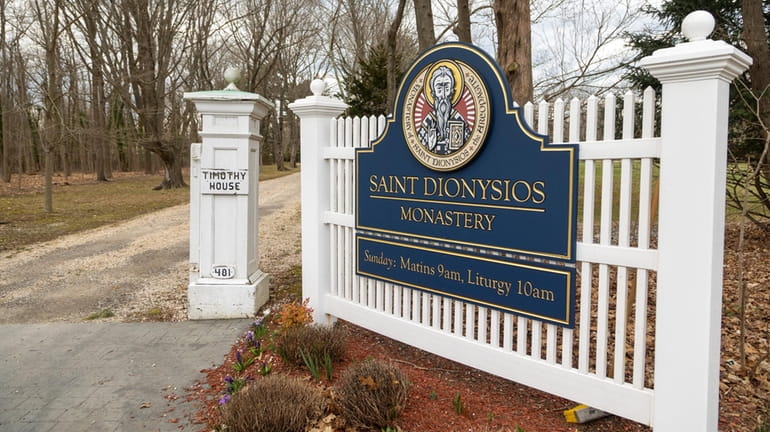Despite opposition, Head of the Harbor monastery gets key approval for church project

This Russian Orthodox monastery in Head of the Harbor now has a special permit allowing it to build a church in a residential zone. The monastery still needs the village's approval of site plans before construction can start. Credit: Barry Sloan
Head of the Harbor officials have given a key approval to a controversial proposal by a Russian Orthodox monastery to build a church next to its historic home.
The village’s board of trustees voted 4-1 at a meeting last week to grant a special permit to the Monastery of the Glorious Ascension to build and operate a new 3,341-square-foot church on its 4.6-acre North Country Road property.
The permit allows the building of a house of worship in a residential zone.
The monastery still needs to submit site plans and receive architectural approval from the village’s planning and trustee boards before construction can start, according to village officials and Melville attorney Joseph Buzzell, who represents the monastery.
Village trustee Judy Ogden voted against the application, saying she still had questions about revisions to the site plan submitted two days earlier.
The property is in the village’s historic corridor and listed on the New York State Register of Historic Places and National Register of Historic Places. It is home to Timothy House, an 1800s-era residence which housed descendants of the Smith family that founded Smithtown. Monks in the monastery, also known as Monastery of Saint Dionysios the Areopagite, live and worship there.
Buzzell said in an interview monastery officials were “very pleased” by the decision, noting his clients need space for their religious services.
“They pray in the living room, basically,” he said.
The monastery must follow at least 18 conditions under the 14-page measure village trustees approved.
Among them, the monastery cannot further develop on the property and must keep lighting “to the minimum required for public safety.” The monks also cannot hold weddings or commercial events on the premises and must require parishioners to use the main driveway.
Some village residents who opposed the special permit held signs at the March 13 meeting telling trustees they would “destroy a historic site” by voting for the measure.
Opponents of the project said they felt the board rushed the vote and reiterated concerns that a church on the Timothy House property would damage the area’s historic corridor.
“This destroys everything. You can’t put a 3,000 square-foot church in this little lot,” said Lisa Davidson, a resident and trustee candidate.
Ogden said in an interview last week she was disappointed other trustees didn't give her time at the meeting to discuss her concerns.
“It was not handled the way it should have been,” she added.
Buzzell said his clients had been “prepared to go to court” if the village ultimately denied their application, citing the monastery’s religious rights as well as zoning issues.
Mayor Doug Dahlgard said in an interview that while Buzzell had expressed that to the village, it was “not the main reason” for the approval.
“It was because the application met all the criteria in our code,” Dahlgard said. “We looked at the covenants, we discussed with our counsel and at the end of the day, we said ‘This is what we can do with the property, and this is what the applicant can build.’”
Trustee Gordon Van Vechten said in an interview that the monastery had made “very substantial changes” from its original application to fit the village’s requirements and “saw no reason to deny them the permit.”
